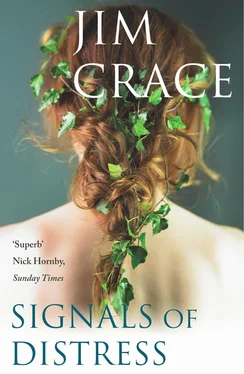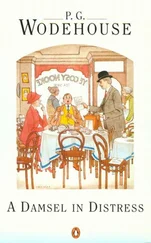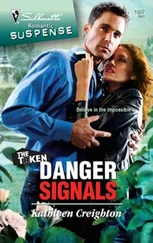Rosie couldn’t stop herself: ‘That in’t no use. You think we’re going to bake our bread from soap? How will we live? A shillin’ is a fine price to be paupered by. It’s a bad-luck shilling and we’ll have none of it.’
‘I intended it to be …’
‘Intended in’t enough!’
Miggy put her head around the door. She thought she’d turn a shilling to a crown: ‘I had a cow roped, Ma. He chased it off. And now we’re gonna starve.’
Aymer blushed again. He’d already spotted Miggy with the young American, peeking from behind the door, and though she was no Katie Norris, she was alluring in a colourless and undramatic way. He liked her peevish, boyish inhibition, and didn’t want to seem a fool in front of her. He didn’t know what he had done to cause such anger, except be honest and considerate. ‘You should not blame me, Mrs Bowe,’ he said. That would have been enough, but he was ill at ease — as ever — and couldn’t stop the puffing elongation of this simple self-defence. ‘I have been the kelper’s friend.’ A pause to find another reason to demand their sympathy and thwart their anger. ‘I have braved a storm at sea in order to be here. Indeed, I’ve sustained an injury. My arm and shoulder bone are cracked.’ (Now his sentences were under canvas. Their sails were full of wind.) ‘But pain has not deterred me from my duty. I have walked a fair few miles from Wherrytown, and it is cold, and there are many kelpers to be spoken to. Your neighbours took my shilling and my soap. I’ve been this morning to the homes of Mr Fowler, Mr Dolly, Mr Hicks … All kelping families, but they were civil.’
‘They’ve got the reason to be civil, in’t they? Kelping’s not their meat and drink. They’ve sons, and boats. Fish is their livin’. Kelping’s for their daughters and their wives to earn a bit of extra for the pot. But we’ve no men or boats.’ ‘I beg you, Mrs Bowe. Do not upset yourself.’ ‘I’ve got a right to speak my mind. You’re standing on my step, and I will speak my mind. What’ll we do without our kelp? Who’ll take my Miggy off my hands, if we’ve no work to keep us proud?’ Aymer waited for Rosie Bowe to sing her daughter’s praises, how she could cook and sew and be a lady’s maid if only Mr Smith would write her name down in his book and find employment for her. But she said nothing more. She simply shook her head and looked at Aymer’s boots.
‘I’m sure your daughter has more worth than what you earn from kelping …’
‘There in’t no worth to being poor, not when it comes to marrying.’
‘Oh, Ma!’
‘ “Oh, Ma,” she says! She’s no idea, that girl. She’s living in her dreams. No man will take a pauper for his bride.’ Behind the door, Ralph Parkiss had his hand on her daughter’s back. She let his fingers tell a rosary of vertebrae down to her waist. She stopped his hand with hers and held his fingers tight. A thought occurred to Miggy Bowe that she would never let his fingers go. She’d hold them here, and on the sea, and in America. She rubbed the rope burns on Ralph’s palm. She faced the stranger in the doorway and she smiled.
A thought occurred to Aymer Smith as well, an extravagant, rushing inspiration which, had he been at home, amongst the comforts of his sitting room, or in the prudent offices of Hector Smith & Sons, might not have found the thinnest purchase on his imagination. But here, emancipated by the open air, by the distance he had come, and by the dislocating alchemy of sea and loneliness and strangers, and by the smiles that he had got from Katie Norris, his head was free for reckless possibilities. There was no one to rein him back. No one to stop him thinking that, perhaps, he’d found a wife at last. What better man than he to take a pauper for his bride? The thought was not preposterous. He’d dress her well. He’d mould her into shape. She’d learn to read and write and cypher. She’d pick up the proprieties of city life and adopt a more womanly demeanour, not gaping or being quite so busy with her legs. She could be taught to breathe through her nostrils and not her mouth. He’d turn her into Katie Norris. She was too gauche and innocent herself to mind that he was inexperienced and old and would not make a pattern husband. He’d offer her the wealth, the education, the status, the emancipation that otherwise could only flourish in her dreams and prayers. She’d bear him children: Aymer Smith & Sons. What would Matthias make of it? He’d be appalled. And jealous, too. Fidia Smith, Matthias’s wife, was thirty-six and pinched in everything but shape. But Mrs Miggy Smith was like a chrysalis. Her best days were ahead. And so were his. So long as he could mend the damage done and earn the sanction of the Bowes.
‘I did not mean … to …’ Aymer said. ‘I take the shilling back.’
‘You’d better grab it, Ma!’
Rosie did what Miggy said. She wasn’t angry any more. Her passions were short-lived, and hardly worth a shilling. She put the coin in a jar.
‘You can come indoors,’ she said. Aymer was relieved and startled by her change of voice and countenance. ‘I’ll get you something warm to drink before you set off back.’
The Bowes had lit a Sabbath fire of kelp, cow dung and timbers from the Belle . It burned in colours that Aymer thought he’d never seen before, colours that an artist could not mix. Miggy and her mother sat together on a bench, their faces halved and reddened by the floating firelight. Ralph Parkiss, petting Whip, squatted on the floor, which was simply earth, flattened once a week with a shovel. He didn’t speak. Aymer had the only chair. They’d made both men hot mahogany, with water, country gin and treacle. (Aymer did not require them to remove the sugar from his drink.) It smelled of fish. The whole place smelled of fish. Smoked herrings hung across the fire. Tubs of salted pilchards were stored beneath the bench and chair. A leather bucket held fish oil, for cooking and for light. Great white wings of fish stiffened on ropes around the cob-and-wattle walls like lines of underwear.
The single room was divided by a sacking curtain, with a box-bed in the almost hidden part. It stood on bare earth which rain had softened to a paste. The only touch of colour to the room was a red petticoat, thrown over rising dough to keep it warm. There weren’t any curtains, cushions, rugs or tablecloths. There was no ceiling, but a raft of timbers made from wrecks. A little light and some dust from the thatch of turfs came through and peppered Aymer’s hair. There were no ornaments, except an embroidered passage from the Bible on the chimney breast:
Weep sore for him that goeth away:
for he shall return no more,
nor see his native country.
Jeremiah
Aymer found the room a little disconcerting: the fish, the petticoat, the privacy, the lack of daintiness, the quiet. But soon the dancing semi-darkness shut out the universe and made their silence comfortable. The two men concentrated on their drinks. Miggy Bowe untied her hair. Rosie had her first chance now to wonder how they’d cope without the benefit of kelp. Some farmers to the east of Wherrytown used untreated seaweed to fertilize their fields, but they would only pay a shilling for a wagon-load. There would be work in summer on the farms across the moor — but what a walk for fourpence a day! Who could live on that? What could they do, then? Find some work in Wherrytown. Cut peat where they had rights of turbary. Joust fish for the boatmen on the coast. Scrump nuts and apples. Poach rabbits, heathcocks, lapwings’ eggs. Glean oats and nettles for bread and soup. Cadge clothes. Steal turnips. Emigrate? They’d find a way. Rosie Bowe was not a melancholic. She had no time for lasting sorrows. Like many people living by the sea she had the bedding of a beggar but the spirit of a bull. There was no denying that the man who sat in her one chair had beached the family just as firmly as the gale had beached the Belle . Their masts were down. Their sides were holed. And they were stuck. But not for long.
Читать дальше












